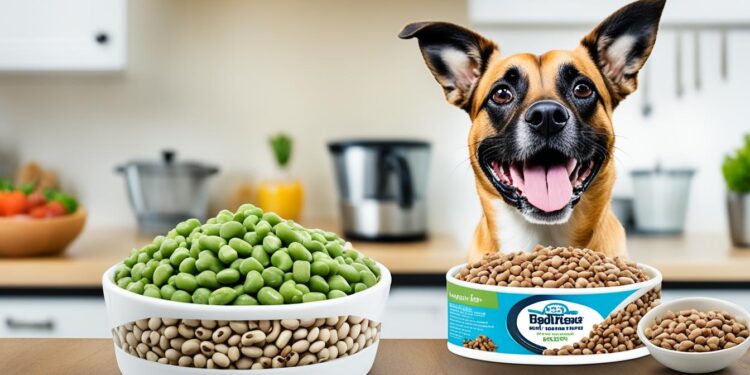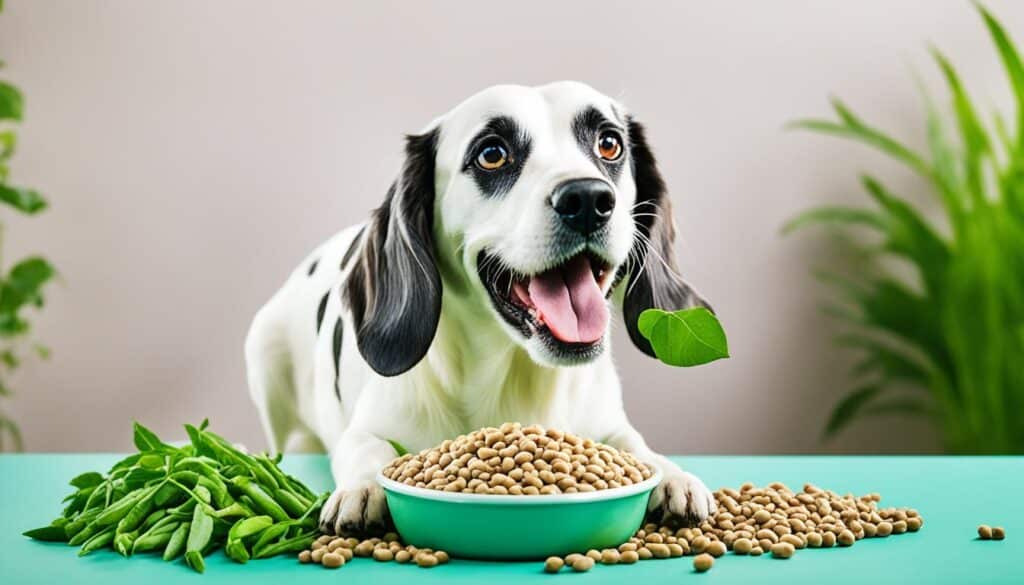Black Eyed Peas and Dogs: A Healthy Match?

Are you looking for a nutritious addition to your dog’s diet? Look no further than black eyed peas! These small, round legumes are not only delicious but also packed with essential nutrients that can benefit your furry friend. In this article, we will explore the benefits of black eyed peas for dogs and provide you with a simple and tasty black eyed peas dog recipe.
Black eyed peas are a fantastic source of fiber, protein, and other important nutrients for dogs. The high fiber content promotes healthy digestion, while the protein content supports muscle growth and repair. Moreover, black eyed peas are low in fat and calories, making them an ideal choice for dogs who need to maintain a healthy weight. The vitamins and minerals found in black eyed peas, such as folate, potassium, and iron, can also contribute to your dog’s overall well-being.
Key Takeaways:
- Black eyed peas can provide dogs with essential nutrients, including fiber, protein, folate, potassium, and iron.
- The high fiber content in black eyed peas can promote healthy digestion in dogs.
- Black eyed peas are low in fat and calories, making them suitable for dogs who need to maintain a healthy weight.
- Cook black eyed peas thoroughly before feeding them to your dog to ensure they are easily digestible.
- Consult with your veterinarian before making any significant changes to your dog’s diet.
How to Incorporate Black Eyed Peas into Your Dog’s Diet
If you’re looking to add the goodness of black eyed peas to your dog’s diet, there are several simple and safe ways to do so. Whether you prefer homemade meals or commercially available dog food, here are some options to consider:
Cooked and Mixed with Regular Food
Cooking black eyed peas and mixing them with your dog’s regular food is a convenient and nutritious option. Ensure that the peas are thoroughly cooked and avoid using any seasoning or spices that may be harmful to dogs. Stick to plain, boiled black eyed peas for your furry companion’s safety. You can then mix the cooked peas with your dog’s regular food to enhance the flavor and provide additional nutrients.
Homemade Meals with Black Eyed Peas
Another way to incorporate black eyed peas into your dog’s diet is by using them as a base for homemade meals. You can prepare a wholesome and balanced meal by combining cooked black eyed peas with other dog-friendly ingredients such as lean protein sources like chicken or turkey, and vegetables like carrots or green beans. Ensure that all ingredients are cooked thoroughly and free from additives or seasonings that may harm your dog.
Commercial Dog Food with Black Eyed Peas
If you prefer the convenience of commercial dog food, look for brands that include black eyed peas as an ingredient. Check the ingredients list to ensure that there are no harmful additives or preservatives. Opt for high-quality dog food brands that prioritize the nutritional needs of your furry friend.
Remember to introduce black eyed peas gradually into your dog’s diet and monitor for any adverse reactions. Every dog is unique and may have different dietary requirements, so consult with your veterinarian before making any significant changes to your dog’s diet.
Image: A bowl of cooked black eyed peas, a safe and nutritious addition to a dog’s diet.
The Benefits of Black Eyed Peas for Dogs
Incorporating black eyed peas into your dog’s diet can offer several health benefits. The high fiber content can help regulate your dog’s bowel movements and prevent constipation. Black eyed peas are also rich in antioxidants, which can help support your dog’s immune system and protect against oxidative stress. Additionally, the folate and iron found in black eyed peas can contribute to healthy blood cell production and overall cardiovascular health in dogs.
It is important to introduce black eyed peas to your dog’s diet gradually, and monitor them for any adverse reactions. This allows their digestive system to adjust to the new food and ensures that they can fully benefit from its nutritional value.
| Benefits of Black Eyed Peas for Dogs: |
|---|
| 1. Regulates bowel movements |
| 2. Supports immune system |
| 3. Protects against oxidative stress |
| 4. Contributes to healthy blood cell production |
| 5. Promotes cardiovascular health |
As with any new addition to your dog’s diet, it is always recommended to consult with your veterinarian before making significant changes, especially if your dog has specific nutritional needs or health conditions. By doing so, you can ensure that offering black eyed peas as part of their diet aligns with their overall well-being and supports their overall health.
Can Dogs Eat Black Eyed Peas?
Dogs can indeed eat black eyed peas, given that they are properly cooked and prepared. However, it is essential to avoid seasoning the peas with any ingredients that may be harmful to dogs, such as garlic, onion, or excessive salt. Plain, boiled black eyed peas are the safest option for dogs, as they do not contain any harmful additives or preservatives.
It’s worth noting that while black eyed peas can offer numerous benefits to dogs, they should not replace a balanced diet specifically formulated for their nutritional needs. Black eyed peas can be incorporated into your dog’s meals as a healthy and nutritious addition, but they should not be the sole source of their dietary requirements.
Conclusion
Incorporating black eyed peas into your dog’s diet can be a beneficial choice for their health and well-being. These nutritious legumes offer a range of advantages, including improved digestion, immune support, and cardiovascular health. Black eyed peas are a great source of fiber, protein, and essential nutrients, making them an excellent addition to your dog’s meals.
When adding black eyed peas to your dog’s diet, it’s important to cook them thoroughly to ensure they are easily digestible. Avoid using any harmful seasonings or spices that may be toxic to dogs. Whether you choose to mix black eyed peas with your dog’s regular food or prepare a homemade meal using them as a base, they can provide a tasty and wholesome option for your furry friend.
However, remember to consult with your veterinarian before making any significant changes to your dog’s diet. They can provide guidance on portion sizes, frequency of feeding, and ensure that black eyed peas align with your dog’s specific nutritional needs and health conditions. A professional opinion will help you tailor your dog’s diet to promote their overall well-being and happiness.
FAQ
Can dogs eat black eyed peas?
Yes, dogs can eat black eyed peas. In fact, black eyed peas can be a healthy and nutritious addition to your dog’s diet.
What are the benefits of black eyed peas for dogs?
Black eyed peas offer several benefits for dogs. They are a great source of fiber, protein, and essential nutrients. Black eyed peas can promote healthy digestion, support muscle growth, and provide vitamins and minerals to support overall health.
How can I feed black eyed peas to my dog?
You can cook black eyed peas and mix them with your dog’s regular food. Alternatively, you can prepare a homemade meal using black eyed peas as a base. Remember to avoid using any seasonings or spices that may be harmful to dogs and to cook the peas thoroughly for easier digestion.
Can I include black eyed peas in my dog’s commercial dog food?
Yes, you can look for commercial dog food brands that include black eyed peas as an ingredient. However, always check the ingredients list to ensure there are no harmful additives or preservatives.
Are black eyed peas good for dog’s digestion?
Yes, black eyed peas can promote healthy digestion in dogs due to their high fiber content. They can help regulate bowel movements and prevent constipation.
Are there any potential risks or allergies associated with feeding black eyed peas to dogs?
As with any new addition to your dog’s diet, it’s important to introduce black eyed peas gradually and monitor your dog for any adverse reactions. While rare, some dogs may have allergies or sensitivities to legumes, including black eyed peas. Always consult with your veterinarian before making any significant changes to your dog’s diet.







